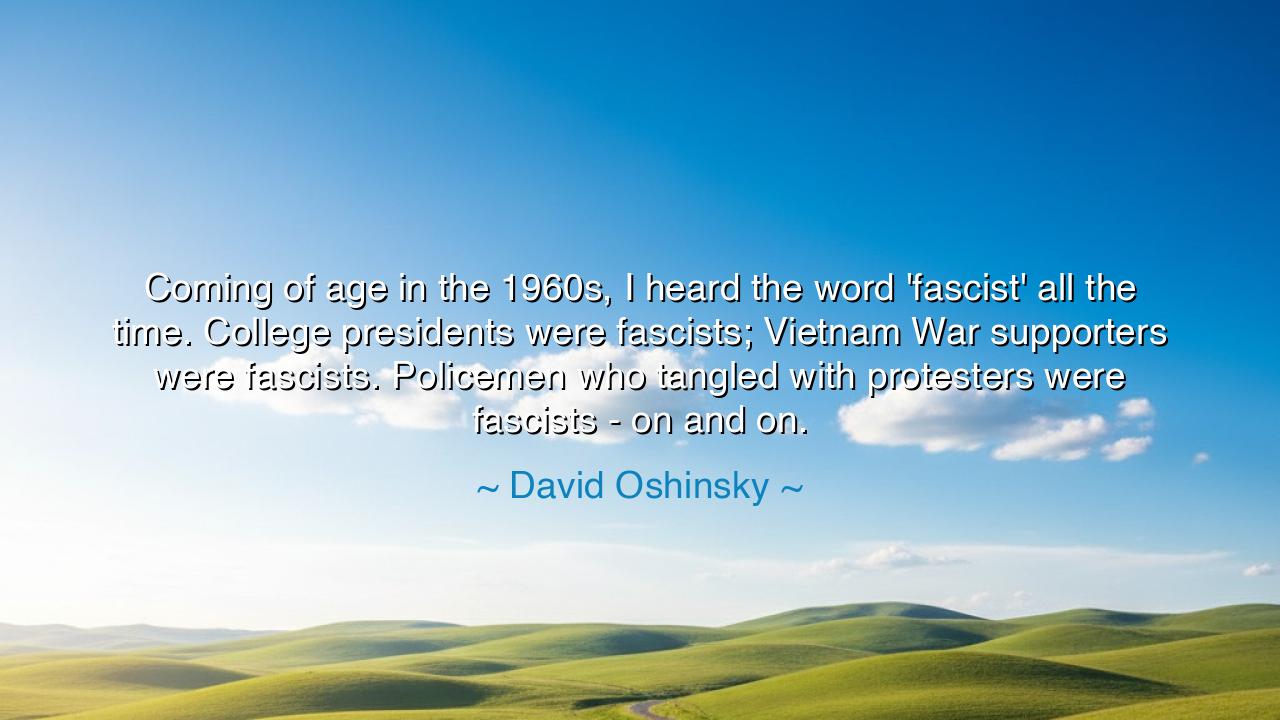
Coming of age in the 1960s, I heard the word 'fascist' all the
Coming of age in the 1960s, I heard the word 'fascist' all the time. College presidents were fascists; Vietnam War supporters were fascists. Policemen who tangled with protesters were fascists - on and on.






Listen, O children of the future, to the words of David Oshinsky, who, in reflecting on his experiences during a turbulent time in history, spoke of the fervent use of the term "fascist": "Coming of age in the 1960s, I heard the word 'fascist' all the time. College presidents were fascists; Vietnam War supporters were fascists. Policemen who tangled with protesters were fascists - on and on." These words carry the weight of an era where the world seemed to be in the midst of a great battle—a battle not only of ideas but of identities, of values, and of how the future would be shaped by the generation coming into power.
The 1960s were a time of rebellion and revolution, a time when the young people of the world sought to break free from the constraints of an old order. They were caught in the throes of social change, protesting wars, challenging authority, and advocating for freedom. In such a time of chaos, the word "fascist" became a weapon, wielded not just against oppressive regimes but against anyone who represented the status quo, anyone who stood in the way of the wave of progress sweeping across the globe. To call someone a fascist was to cast them as an enemy of liberty, a person who sought to crush the freedoms of the individual under the boot of authoritarian control.
Yet, this is where the danger lies. For when a term like "fascist" is used so freely, so indiscriminately, it loses its meaning. The term, which once referred to brutal regimes like Mussolini's Italy or Hitler's Germany, was now applied to anyone with whom one disagreed. College presidents who sought to maintain order were branded as fascists; those who supported the Vietnam War were accused of supporting an imperialist, oppressive agenda. Even the police, who were seen by some as the enforcers of the old guard, were labeled as agents of fascism for their confrontations with protesters. In the heat of protest and revolution, the very word that had once denoted a specific form of tyranny became a catch-all for any authority figure who opposed the radical vision of the young.
Consider, O wise ones, the example of Germany during the rise of Nazi fascism. Under Hitler, fascism was not merely a term used to describe a political stance—it was a system that sought to control every aspect of life, from the press to the schools to the very thoughts of the people. It was a regime marked by brutal oppression, genocide, and a total disregard for the dignity of human life. In contrast, the term "fascist" used in the 1960s often lacked such weight. The comparison of anyone who upheld authority with the Nazi regime was a misapplication of a word with deep historical significance. This overuse of the term threatened to dilute the power of the word, making it harder to distinguish between true oppression and the challenges faced by those who were simply trying to maintain a diverse and complicated society.
However, O children, this is not to say that the youth of the 1960s were wrong to challenge the systems of their time. They were right to question the world they inherited, a world scarred by the devastation of war, inequality, and corruption. Protests and rebellions have always been a part of the natural cycle of history, just as the struggle for freedom and justice has always required the courage of the younger generation. In this sense, the word "fascist" became more than a political label—it became a symbol of the forces that young people saw as standing in the way of progress, of the forces that sought to suppress the freedom and change they desired.
But the lesson here, O children, is one of wisdom in the use of language. Words are powerful, and when used carelessly, they can strip away the meaning that makes them potent. To call someone a fascist in a world where the true forces of fascism have long been defeated is to weaken the very concept of tyranny. We must be careful with our words, for they shape our world. David Oshinsky’s reflection calls us to recognize that rebellion must not lose sight of truth, and that in the fight for justice, we must ensure that our language does not become a weapon of confusion and misunderstanding.
Therefore, O children of the future, take this lesson to heart: when you speak, speak with purpose and with care. Do not allow your words to become empty labels that obscure the true meaning of what you seek to express. Challenge the systems of your world, but do so with an understanding of the power of language. Let your words reflect not just the heat of your emotions but the depth of your wisdom. In doing so, you will find that you do not need to use the word "fascist" to define your enemies, but instead, you will wield the power of truth to reveal the true forces of oppression and bring about the change you seek in a world that is, as always, full of challenges.






AAdministratorAdministrator
Welcome, honored guests. Please leave a comment, we will respond soon